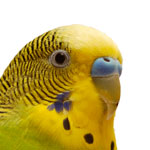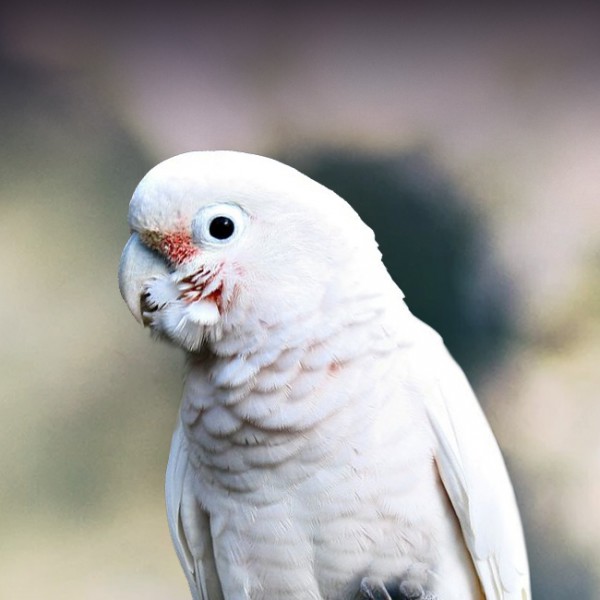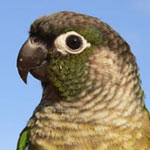Attached is an excerpt of the Aria to Bachs Goldberg Variations with a Northern Cardinal singing. Theres also a House Finch and a bit of what sounds like a juvenile White-Throated Sparrow in there too, and Chimney Swifts twittering up high.
Birds are not the only creatures attracted to music. You may have a cat or dog that likes to sit under the piano while you play, or at your feet with your guitar or whatever your instrument. You may have figured out your house plants grow better with classical music in the background. Maybe your tropical fish swim like theyre dancing when theres music playing.
Birds are the most obviously musical creatures to us. Those that are called songbirds do just that they sing. But their other vocalizations are often musical to our ears as well. Songbirds dont hear the same range of tones that we do: they tend to hear higher pitches than we can but they wont hear lower pitches as well. But its hard to imagine our hearing surpassing that of the birds, because they seem to be so acutely aware of every sound.
When I first realized birds were listening to me play, I thought I could relate to them by imagining how they were listening. I remember thinking that if I had been walking by while someone was playing music with the window open on the third floor of an apartment, I would have had to stop and listen. Yet no human being as far as I know ever did. The humans werent listening to birds either, though, and until I was made aware of birds I wasnt listening either. Admittedly something happened to me when I started listening to the birds. I became more aware of all sounds. Noise became noisier to me. And the slightest sounds of wind rustling leaves of trees or the proverbial pin dropping were more noticeable as well.
If everything a songbird utters has a musical tone to it, Id like to think its orientation to life is like being in a constant opera. Or maybe its more like a human tone language in that the meaning depends a lot on the pitch. Either way, I suspect music is a natural state-of-being for a songbird.
Not all music, of course, is going to interest birds in the same way, they have their tastes too. My birds at home are definitely put off by Messiaen, who wrote out the songs of birds and put them into his music. There are two things operating here: first of all, human instruments imitating bird songs dont sound exactly like birds, and the birds know that. When I imitate one of my birds songs by playing it on the piano, I get stone silence. They react more favorably if I sing it or whistle it, much as I can get wild birds to countersing with my incompetent whistles. Also, I have found my birds relate better to baroque or romantic music, anything preceding 20th Century atonal music, I suppose because they like to know what key theyre supposed to be thinking in. Cant blame them for that. Theyll talk over loud or keyless music but they wont blend in, harmonize or sing along with it.
Why Parrots Dance & The Music Genre Most Birds Hate
 Our response to music is seen in many different ways and on many different levels. Music can induce happiness, sadness, and a multitude of other emotions. Its why we listen to it. But do animals experience the same type of emotions that we do? The internet is awash with YouTube videos of parrots and other birds bopping along to a song. Of course, a song lyrics meaning is presumably lost on a parrot, but certainly the music, with its varied sets of beats, harmonies, vocal patterns and other elements, can invoke a behavior in a bird that is often relatable. Plus, its easy to recognize that birds themselves employ their own birdsong with which to communicate and to infatuate others of their kind.
Our response to music is seen in many different ways and on many different levels. Music can induce happiness, sadness, and a multitude of other emotions. Its why we listen to it. But do animals experience the same type of emotions that we do? The internet is awash with YouTube videos of parrots and other birds bopping along to a song. Of course, a song lyrics meaning is presumably lost on a parrot, but certainly the music, with its varied sets of beats, harmonies, vocal patterns and other elements, can invoke a behavior in a bird that is often relatable. Plus, its easy to recognize that birds themselves employ their own birdsong with which to communicate and to infatuate others of their kind.
Birdsong has been studied extensively since Darwin to see if it is a characteristic that produces pleasing music. Over time, researchers have examined the various brain reactions to music to ascertain the true intentions or whether birds experience a pleasurable “reward” moment. Scientists discovered that female birds responded to birdsong in a manner similar to humans, without delving into the exceedingly intricate testing phases designed for a 2012 Emory University study. To put it briefly, female birds’ brains use the same neural pathways that the human brain uses. They showed a different acceptance for male birds, one that was more difficult to categorize as neutral, negative, or positive. In fact, some songs appeared to make male birds angry.
Regarding music produced by humans that a bird hears, many bird watchers believe that birds appreciate it and occasionally show this appreciation through dancing. Typical parrot dances include pumping and bobbing motions, pacing back and forth, and other movements that could be interpreted as a physical reaction to the music being played. It’s true that certain birds pick up movement during their “favorite” song because they were trained to do so. Many owners just turn on a song and start dancing, which causes the bird to mimic. The bird will eventually learn to “jump start” and “dance” to the same song that taught it how to do so.
Ultimately, there are many stories of birds responding to a particular style of music, even to the point of rejecting a song by behavior recognizable to the owner as a dislike response. Other studies have supported that parrots can be choosy as to the type of music they prefer. Some seem to prefer calm and complex classical music, some calm Pop, while others appreciate louder, more raucous tunes. But it was determined that most, if not all, of the birds disliked the popular electronic dance music. Given human and creature individuality, its not surprising that birds exhibited a unique preference to what they were willing to hear.
A different, tiny study revealed that some parrots could choose songs on their own. The installation of touch screens in the birds’ cages allowed them to easily access a variety of musical genres, revealing individual preferences. Over a month-long period, the two parrots individually chose their favorites at least 1,400 times. This study recommends giving parrots in their cages access to select jukeboxes as an additional form of self-entertainment.
Much is still unknown about how birds appreciate music. However, one thing is certain among bird owners: their birds appear to enjoy some sort of music, albeit not harsh ambient electronica. categories.










I would like to think that a songbird’s outlook on life is similar to being in a continuous opera if everything it says has a melodic quality. Alternatively, it could resemble a human tonal language more, with significant pitch dependence for meaning. In any case, I believe that a songbird’s natural state of being is music.
An excerpt of Bach’s Goldberg Variations’ Aria featuring a Northern Cardinal singing is attached. A House Finch and what appears to be a young White-Throated Sparrow can also be heard, along with Chimney Swifts twittering at great altitudes.
Birds are the most obviously musical creatures to us. Singing is what those dubbed songbirds actually do. However, we frequently perceive their other vocalizations as musical as well. Songbirds’ hearing differs from ours in that they typically detect higher pitches than we do, but they are also unable to detect lower pitches. However, it’s difficult to imagine that humans have better hearing than birds, who appear to be extremely sensitive to all noises.
I thought I could relate to birds by picturing how they were listening when I first realized they were watching me play. I recall thinking that I would have had to stop and pay attention if I had been passing by and there was music being played through an open window on the third floor of an apartment building. However, as far as I’m aware, no human has ever done But until I was made aware of birds, neither the humans nor I were paying attention to the birds. To be honest, when I started to listen to the birds, something happened to me. I became more aware of all sounds. Noise became noisier to me. Additionally, even the smallest noises, like the rustle of leaves on trees or a pin dropping, were more audible.
Birds are not the only creatures attracted to music. Your pet may enjoy curling up at your feet with your guitar or other instrument, or beneath the piano when you perform. Perhaps you’ve discovered that your houseplants thrive when there’s classical music playing in the background. Perhaps when music plays, your tropical fish swim as though they’re dancing.
FAQ
What genre of music do birds like the most?
Is classical music good for birds?
Do birds like the sound of music?
Is it good to play music for birds?